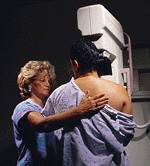- The Best Time of Day to Drink Bone Broth to Maximize Health Benefits
- 8 Ways to Increase Dopamine Naturally
- 7 Best Breads for Maintaining Stable Blood Sugar
- Gelatin vs. Collagen: Which is Best for Skin, Nails, and Joints?
- The Long-Term Effects of Daily Turmeric Supplements on Liver Health
- Could Your Grocery Store Meat Be Causing Recurring UTIs?
- Are You Making This Expensive Thermostat Error This Winter?
- Recognizing the Signs of Hypothyroidism
- 10 Strategies to Overcome Insomnia
- Could Artificial Sweeteners Be Aging the Brain Faster?
Experts Issue Treatment Guidelines for Aggressive Form of Breast Cancer


Two sets of guidelines for treating patients with an aggressive form of breast cancer have been released by the American Society of Clinical Oncology (ASCO).
According to ASCO, about 15 percent to 20 percent of breast cancers are known as “HER2-positive,” meaning that they carry high levels of the HER2 protein, which causes tumor cells to grow and divide faster than happens with most other breast cancers. This means that HER2-positive cases are especially aggressive and tough to treat.
However, doctors now “have several treatments for advanced HER2-positive breast cancer, all of which are associated with improved survival,” Dr. Eric Winer, co-chair of the expert panel that developed the guidelines, said in an ASCO news release. “We’re very fortunate that now we have multiple studies that give us a clear picture of how these newer agents should be used.”
In the first guideline, the group recommends treatments for women newly diagnosed with advanced HER2-positive breast cancer and those with early stage breast cancer that has progressed to an advanced stage.
After examining 19 studies, Winer and his colleagues on the panel advised a combination of standard chemotherapy plus two other drugs, trastuzumab and pertuzumab, as first-line treatment. For certain patients — such as those with contraindications and/or slow-growing hormone receptor-positive cancers — chemotherapy-based treatment may be replaced with hormonal therapy given with or without either trastuzumab or lapatinib, the panelists said.
Trastuzumab emtansine (T-DM1) is recommended as a second-line therapy if the first line of treatment fails, the guideline says.
For third-line therapy and beyond, treatment depends on a patient’s previous breast cancer treatments. Options include T-DM1, hormonal therapy or chemotherapy with trastuzumab and in some cases with lapatinib, the combination of trastuzumab and lapatinib, or a pertuzumab-based regimen if the patient did not previously receive pertuzumab.
The second set of guidelines outlines treatments for treating cancer that has spread (metastasized) to the brain in women with advanced HER2-positive breast cancer.
Surgery and/or radiation therapy are recommended for patients with a good chance of survival, depending on the size and number of brain tumors, chances of surgical success and symptoms.
Treatment options for patients with a low chance of survival include surgery, whole brain radiation therapy and certain drugs that may prove effective, such as lapatinib and capecitabine.
Other options for these patients include taking part in a clinical trial, supportive care and/or palliative care.
Brain metastases occur in 30 to 40 percent of women with HER2-positive breast cancer. These patients can live two years or more after being diagnosed with brain metastases. This is the first guideline specifically for such patients.
“Brain metastases can compromise neurologic function, and treatments are designed to preserve neurologic function and minimize the decline in quality of life,” Dr. Sharon Giordano, co-chair of the panel that developed the guideline, said in the news release.
“But at the same time, some of the treatments for brain metastases have side effects that can negatively affect cognitive function. We hope that this guideline will help standardize care for these patients and balance toxicities and benefits of treatment.”
Both guidelines were published May 5 in the Journal of Clinical Oncology.
More information
The U.S. National Cancer Institute has more about breast cancer treatments.
Source: HealthDay
Copyright © 2026 HealthDay. All rights reserved.










